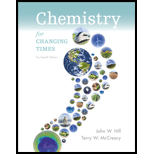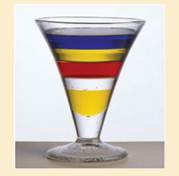
Concept explainers
Materials Needed:
• 1/4 cup dark corn syrup
• 1/4 cup dishwashing liquid
• 1/4 cup water
• 1/4 cup vegetable oil
• 1/4 cup rubbing alcohol
• A tall 12-ounce glass or clear plastic cup
• Food coloring
• Measuring cup
When you drop an ice cube into your glass of water, what happens? Everyone knows that ice floats.. . but. why? The simple answer is density.
Water and ice, even though they are made of the same substance, have different densities. Density is a measurement of the ratio of the mass of something to its volume. Remember the density equation (Density = Mass/volume).
For this experiment you will need to locate different liquids that can be found in kitchen and bathroom cabinets. One way you could determine which liquids have higher or lower densities would be to weigh them, but this experiment involves layering the liquids to learn something about the densities of these common household items.
Before you start your experiment, prepare 1/4 cup of rubbing alcohol with a few drops of food coloring (either blue or green) and prepare 1/4 cup of water with food coloring (red or orange).
Take the 12-ounce clear glass (slim ones work best). Being careful not to get syrup on the side of the glass, pour the syrup into the center of the bottom of the glass. Pour enough syrup to fill the glass one-sixth of the way.
After you have added the syrup, tip the glass slightly and pour an equal amount of the dishwashing liquid slowly down the side of the glass. Be careful to add the next liquids slowly. Tip the glass slightly, and pouring slowly down the side of the glass, add first the colored water, then the vegetable oil, and finally the colored rubbing alcohol.
2. Can you determine what the relationship is between the density of a liquid and its position in the glass?

Want to see the full answer?
Check out a sample textbook solution
Chapter 1 Solutions
Chemistry For Changing Times (14th Edition)
- You receive a mixture of table salt and sand and have to separate the mixture into pure substances. Explain how you would carry out this task. Is your method based on physical or chemical properties? Explain.arrow_forwardHow do molecules of elements and molecules of compounds differ? In what ways are they similar?arrow_forward1.80 All molecules attract each other to some extent, and the attraction decreases as the distance between particles increases. Based on this idea, which state of matter would you expect has the strongest interactions between particles: solids, liquids, or gases?arrow_forward
- How does an element differ from a compound? How are they similar?arrow_forwardAnalyses of several samples of a material containing only iron and oxygen gave the following results. Could this material be a compound?arrow_forwardWhat properties distinguish solids from liquids? Liquids from gases? Solids from gases?arrow_forward
- Describe how the process offiltrationcould be used to separate a mixture into its components. Give an example.arrow_forwardScientific models do not describe reality. They are simplifications aid therefore incorrect at some level. So why are models useful?arrow_forwardThe photo below shows elemental iodine dissolving in ethanol to give a solution. Is this a physical or chemical change?arrow_forward
- What is the main difference between electrostatic forces and gravitational forces? Which is more similar to the magnetic force? Can two or all three of these forces be exerted between two objects at the same time?arrow_forwardHow does a heterogeneous mixture differ from a homogeneous mixture? How are they similar?arrow_forwardYou have learned the basic way in which scientists analyze problems, propose models to explain the systems under consideration, and then experiment to test their models. Suppose you have a sample of a liquid material. You are not sure whether the liquid is a purecompound(for example, water or alcohol) or asolution. How could you apply the scientific method to study the liquid and to determine which type of material the liquid is?arrow_forward
 Chemistry & Chemical ReactivityChemistryISBN:9781337399074Author:John C. Kotz, Paul M. Treichel, John Townsend, David TreichelPublisher:Cengage Learning
Chemistry & Chemical ReactivityChemistryISBN:9781337399074Author:John C. Kotz, Paul M. Treichel, John Townsend, David TreichelPublisher:Cengage Learning Chemistry: The Molecular ScienceChemistryISBN:9781285199047Author:John W. Moore, Conrad L. StanitskiPublisher:Cengage Learning
Chemistry: The Molecular ScienceChemistryISBN:9781285199047Author:John W. Moore, Conrad L. StanitskiPublisher:Cengage Learning Introductory Chemistry: A FoundationChemistryISBN:9781337399425Author:Steven S. Zumdahl, Donald J. DeCostePublisher:Cengage Learning
Introductory Chemistry: A FoundationChemistryISBN:9781337399425Author:Steven S. Zumdahl, Donald J. DeCostePublisher:Cengage Learning Introductory Chemistry: An Active Learning Approa...ChemistryISBN:9781305079250Author:Mark S. Cracolice, Ed PetersPublisher:Cengage Learning
Introductory Chemistry: An Active Learning Approa...ChemistryISBN:9781305079250Author:Mark S. Cracolice, Ed PetersPublisher:Cengage Learning Chemistry for Engineering StudentsChemistryISBN:9781337398909Author:Lawrence S. Brown, Tom HolmePublisher:Cengage Learning
Chemistry for Engineering StudentsChemistryISBN:9781337398909Author:Lawrence S. Brown, Tom HolmePublisher:Cengage Learning





